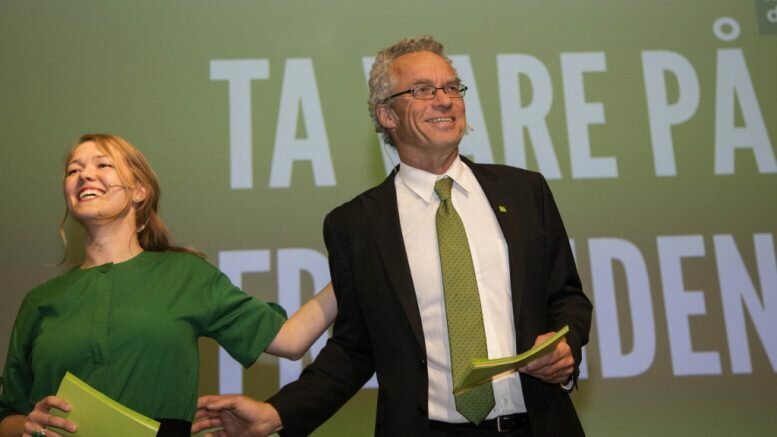Røe Isaksen: “MDG policy cripples important businesses”
Norwegian Minister of Industries, Torbjørn Røe Isaksen (Conservatives), likes several proposals in the plan of the Green Party (MDG) regarding what Norway should live off after petroleum but refutes its overall industry policy.
«The Greens’ plan for Norway after the oil» is the resolution in which the MDG sets out the business policy course for an oil-free future. The Green Party is gathered for its National Congress at Fornebu outside Oslo this weekend.
Key elements are Innovation and Entrepreneurial and Green Transition packages for the Norwegian economy that will create 15,000 jobs each year for the next ten years. NOK 10 billion will be spent on restructuring and innovation annually – if they win through.
Support for a Seed Bank, expansion of the Tax Deduction scheme (Skattefunn), increased «green» research, commercialisation and piloting tax benefits for «green» businesses are all proposals that Røe Isaksen welcomes.
“The problem with the business policy of the MDG is not this resolution. The problem is that they, at the same time, will hurt many of the larger industries that we have. Industries, which drives «green» innovation and technology development as well,” he tells NTB.
Forestry, industry and oil
Earlier this year, Røe Isaksen reprimanded those who criticise Norwegian industry and business in the debate surrounding what to live off after the oil age.
“When I see the attacks on one industry after the other, it’s time to ask: What should we actually live off in this country? Public consumption? Subsidies? Dreams? Digital landscape? Lobbying?Pencil pushing? Reality TV?” He mocked.
“The industry policy of the MDG will tear away the foundation for a «green shift»,” Røe Isaksen fears.
“It is difficult to see how forestry and wood processing industry will be able to cope with the protection ambitions of the MDG. And ordinary Norwegian industry is dependent on a CO2 compensation scheme, to prevent companies from moving their production to areas where they can contaminate more,” the Conservative Cabinet Minister elaborates.
MDG will increase spending
“The oil industry is also important. The Norwegian supplier industry will be central to developing technology that will be important in the «green shift»,” Røe Isaksen continues. adding:
“If you tear away the entire oil and gas industry from the supplier industry, it will not survive very long.”
Environmental spokesperson of the Progress Party, Gisle Meininger Saudland, calls for calculations from the MDG on how welfare will be financed without the oil and gas industry.
“It is therefore remarkable that a motion for a resolution tabled by MDG referred to as «The Greens’ plan for Norway after the oil» is almost entirely made up of proposals that will increase public spending. It does, however, in no way take into account the fact that the covering thereof will disappear without the oil industry.” Saudland tells NTB.
Saudland also points out that several of the proposals in the MDG resolution is politics the government implements today.
“The difference is that we see that this ambitious climate and environmental support cannot be made possible without the income from the petroleum industry,” he points out.
Offshore wind will provide jobs
National Spokesperson of MDG, Une Bastholm confronts the question of what Norway should live off after the oil in her speech at the congress. “We, as a matter of fact, do not exclusively sustain on oil in this country, but rather on people’s work effort. Nine out of ten are not employed in the oil industry,” she points out.
MDG wishes to phase out the oil industry gradually over 15 years, and believes that it is urgent to commence planning for that.
“A large-scale investment in offshore wind will provide Norway with many thousands of jobs,” Bastholm continues.
She is highly critical of the development of the giant oil field Johan Sverdrup, which over the next 50 years will contribute 1.3 billion tonnes of CO2 (gross) to the atmosphere.
The MDG resolution states that a clear decision to end the oil age will provide «predictability and trigger innovation and new venture which, in itself, will create much new activity».
© #Norway Today











